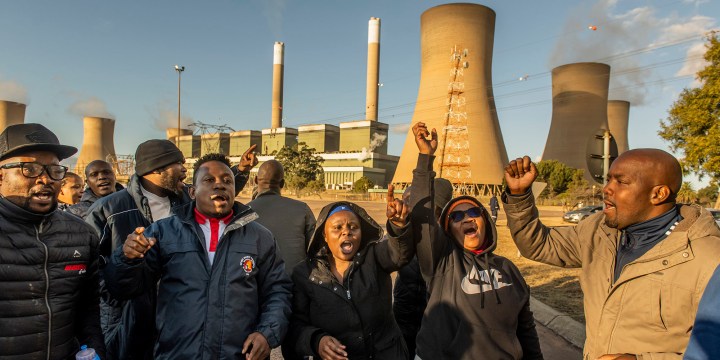POWER CRISIS
Stalemate looms after Eskom raises wage hike offer from 3.75% to 4.5%

Eskom raised its wage hike offer to three unions to 4.5% from 3.75% as the third round of wage talks kicked off on Tuesday. With union demands ranging from just above 10% to 12%, the talks seem headed for a stalemate and arbitration.
Eskom has unions seeing red again after it made a slight increase in its wage offer as detailed in a document seen by Daily Maverick. At 4.5%, effective from 1 July 2023, it falls far short of union demands at a time of high inflation and rising interest rates that will be putting a squeeze on the household finances of many members.
Union sources have told Daily Maverick that the National Union of Metalworkers of South Africa (Numsa) has dropped its demand to 12% from 15% initially. The National Union of Mineworkers (NUM), which made that move two weeks ago, now has an 11% pay hike demand on the table.
Solidarity, which represents mostly skilled workers including supervisors, has retained its demand of CPI +3%. CPI in March was running at 7.1%, but Solidarity’s equation is based on a rolling 12-month average, which would be in that ballpark. Solidarity and Eskom have agreed to several other side issues such as long-service awards.
This is the third and final scheduled round of talks, which are set to end on Thursday, 25 May. The parties can agree to a further round if they feel an agreement is within reach, but if a stalemate is clear, a dispute will be called and the process will go to conciliation.
Eskom employees cannot embark on a protected strike because their service is deemed essential. But last year’s talks, which ended with a 7% pay hike for one year across the board, sparked protests and walkouts by some Eskom staff. Such a scenario this year, with Stage 8 power cuts looming, could potentially trigger even more of the blackouts that have crippled the economy.
There is a lot of bad blood between the two sides, with the unions long accusing Eskom management of arrogance and unprofessionalism.
Eskom has maintained that it cannot afford increases that match or exceed inflation even in the wake of its debt relief package. Unions, for their part, have pointed to money lost to alleged corruption and what they see as questionable (read costly) contracts for contractors, and hold that public perceptions that their members at Eskom are overpaid are overblown.
‘Eskom can comfortably meet our demands’
The unions also hold that labour costs are far from Eskom’s biggest burden.
“Primary energy costs account for 70% of Eskom’s operational expenditure and it is increasing year on year by more than 15%, while the bargaining unit salary costs which account for an average 8% of Eskom’s operational costs, have remained almost the same, which is why we say they can comfortably meet our demands,” Numsa’s Irvin Jim said in a statement on Monday.
Eskom employees — by Daily Maverick’s calculations, based on answers provided by the utility to unions — have an average total monthly package of about R64,000, but that includes everything and 9% of those costs are for overtime.
The average basic wage or salary is closer to R40,000 a month. The average monthly nominal salary in South Africa, according to BankservAfrica’s Five-Year Review of Take-home Pay and Private Pensions, amounted to R15,438 in February 2023. And salary increases have not kept pace with inflation.
Eskom employees therefore appear to be making close to three times the national average, but unions say that conceals wide pay disparities within the utility — NUM refers to the “apartheid wage gap” — and many of the utility’s employees are highly skilled in crucial tasks such as ensuring that the grid does not collapse.
Read more in Daily Maverick: Solidarity boss slams public perception that Eskom employees are overpaid
It’s a sticky situation all around. Eskom’s business model sucks, it is hardly flush with cash, and it does clearly have governance and corruption issues. Meanwhile, many of its employees have several dependants whose ranks are probably swelling in this grim economy at a time when food inflation has raced to 14-year highs of more than 14%.
Many will also have bonds on their homes and other debt while the South African Reserve Bank looks likely to hike rates again on Thursday, 27 May to stem the rand’s recent meltdown.
There is currently just no light at the end of this impasse. DM



















 Become an Insider
Become an Insider
If increases were based on performance and productivity, then we would eventually see an improvement in power generation. Working for an international company which does not provide inflation increases but productive increases or promotion increases helps to improve the company’s growth.
Although it is tempting to say they provide no power, they get no pay, more soberly it is not possible to say which side is correct. ZAR40,000 certainly sounds a lot for manual workers, but we have no idea on the skilled/non-skilled split.
All we can say is that perhaps a more intelligent structure would be a good idea, like linking pay rises to reduction in theft and sabotage. Of course, like any corrupt organisation, there are probably less than 5% of people who are actually corrupt or mafia-linked, but like all corruption there is usually 25% who see nothing, hear nothing, thus enabling the others. Those are the people who are reachable for changing the culture. There can also be rewards for anonymous whistleblowers, like providing collective rewards instead of individual rewards so the person is never identified.
Of course if Eskom is broken by design, perhaps it just needs to be disbanded in favour of mini-grids, within states or cities, which are voluntarily linked to the macro-grid with interchange stations. That way, smart grids can be built with local taxes allowing constant power in business critical areas, with support from local generation, renewable, carbon-efficient or emergency.